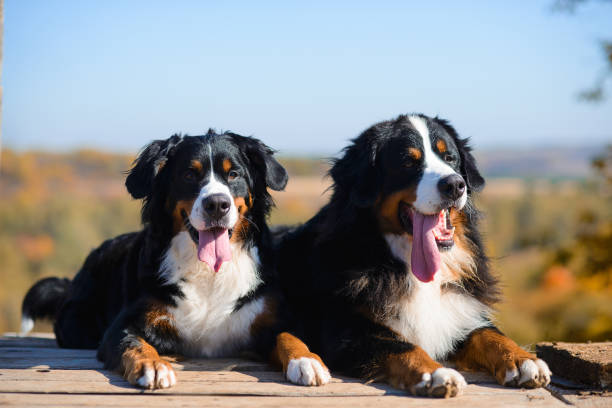How to Ensure Your Bernese Mountain Dog Lives Its Best Life: Essential Tips for Maximizing Lifespan

How to Ensure Your Bernese Mountain Dog Lives Its Best Life: Essential Tips for Maximizing Lifespan
Introduction
Bernese Mountain Dogs are known for their gentle temperament, striking appearance, and loyal companionship. Ensuring that your Bernese Mountain Dog lives a long, healthy, and happy life is a priority for any owner. In this article, we’ll explore essential tips to help maximize your furry friend’s lifespan and quality of life.

Understanding the Bernese Mountain Dog
History and Origin
Originating from the Swiss Alps, the Bernese Mountain Dog was traditionally used as a farm dog, helping with tasks such as pulling carts and herding cattle. Their history of hard work and companionship has made them a beloved breed worldwide.
Physical Characteristics
Bernese Mountain Dogs are large, sturdy dogs with a thick double coat. They have a distinctive tri-color appearance, typically black, white, and rust. Their strong build and gentle eyes are a testament to their friendly and loyal nature.
Temperament and Behavior
Known for their calm and friendly disposition, Bernese Mountain Dogs are great family pets. They are loving, smart, and keen to please, which makes them quite trainable.
. However, they can be somewhat reserved with strangers, which highlights the importance of proper socialization.
Nutrition and Diet
Importance of a Balanced Diet
A balanced diet is crucial for maintaining your Bernese Mountain Dog’s health. Proper nutrition supports their immune system, maintains a healthy coat, and provides the energy needed for their daily activities.
Recommended Foods
High-quality commercial dog food, specifically formulated for large breeds, is recommended. Look for foods rich in proteins, healthy fats, and essential vitamins and minerals. Incorporating fresh fruits and vegetables can also provide additional nutrients.
Foods to Avoid
Avoid feeding your dog foods high in fat, sugar, and artificial additives. Foods like chocolate, grapes, onions, and certain nuts can be toxic to dogs and should be strictly avoided.
Portion Control and Feeding Schedule
Portion control is vital to prevent obesity, a common issue in Bernese Mountain Dogs. Follow feeding guidelines based on your dog’s age, weight, and activity level, and establish a regular feeding schedule.
Exercise and Physical Activity
Daily Exercise Needs
Bernese Mountain Dogs require regular exercise to maintain their physical health and prevent boredom.Strive for 30 minutes to an hour of daily exercise.
Exercise Options for Bernese Mountain Dogs
Engage in activities like walking, hiking, and playing fetch. These dogs also enjoy tasks that stimulate their minds, such as agility training and puzzle games.
Benefits of Regular Physical Activity
Regular exercise helps maintain a healthy weight, strengthens muscles, and promotes cardiovascular health. It also provides mental stimulation and can help alleviate behavioral issues.
Mental Stimulation and Training
Importance of Mental Stimulation
Mental stimulation is equally crucial as physical exercise.
It helps prevent boredom, reduces stress, and promotes overall well-being.
Training Techniques
Positive reinforcement techniques, such as treats and praise, work best for training Bernese Mountain Dogs.Consistency and patience are essential for effective training.
Interactive Toys and Games
Provide interactive toys and games to keep your dog mentally engaged. Puzzle toys, treat-dispensing toys, and interactive games like hide-and-seek can be highly beneficial.
Regular Veterinary Care
Importance of Regular Check-Ups
e.Regular veterinary check-ups are vital for monitoring your dog’s health and identifying potential issues early. Schedule annual visits and adhere to your vet’s recommendations.
Vaccinations and Preventive Care
Keep your dog up-to-date on vaccinations and preventive treatments for parasites like fleas, ticks, and worms. Preventive care is crucial for maintaining overall health.
Common Health Issues in Bernese Mountain Dogs
Bernese Mountain Dogs are prone to health issues such as hip dysplasia, elbow dysplasia, and certain cancers. Regular check-ups and a healthy lifestyle can help manage and prevent these conditions.

Grooming and Hygiene
Coat Care and Grooming Tips
Bernese Mountain Dogs have a thick double coat that needs regular grooming. Brush their coat several times a week to prevent matting and reduce shedding.Brushing regularly keeps their coat clean and reduces shedding.
Regularly brush your dog’s teeth and offer dental chews. Trim their nails to avoid overgrowth and discomfort.
Creating a Safe and Comfortable Environment
Suitable Living Conditions
Bernese Mountain Dogs thrive in environments with ample space to move around. They prefer cooler climates and should have access to a comfortable indoor area.Make sure your home and yard are secure for your dog.
Comfortable Sleeping Arrangements
Provide a comfortable bed in a quiet, draft-free area where your dog can feel secure.Introduce them to various people, animals, and settings early on.
Positive experiences can alleviate anxiety and boost confidence.
Dealing with Separation Anxiety
Bernese Mountain Dogs can develop separation anxiety if left alone for long periods. Provide toys, create a safe space, and consider doggy daycare or a pet sitter if needed.
Recognizing Signs of Aging
Typical Signs of Aging in Bernese Mountain Dogs
As your dog ages, you may notice changes such as reduced energy, stiffness, and gray hairs. Regular vet visits become even more important to manage age-related health issues.
Adjusting Care Routines for Senior Dogs
Adjust your care routines to accommodate your senior dog’s needs. This may include changing their diet, reducing exercise intensity, and providing additional comfort and support.
Holistic and Alternative Care
Benefits of Holistic Care
Holistic care focuses on overall well-being, considering physical, emotional, and environmental factors. This approach can complement traditional veterinary care.
Alternative Therapies and Treatments
Explore alternative therapies such as acupuncture, chiropractic care, and massage. These treatments can help manage pain and improve quality of life.Before adding any new supplements, consult your veterinarian to confirm their safety and suitability.
Traveling with Your Bernese Mountain Dog
Tips for Safe Travel
Plan ahead to ensure safe travel with your dog. Use a secure harness or crate, and make frequent stops for bathroom breaks and exercise.Bring comforting items such as a familiar blanket or toy.
Accommodating Your Dog on Trips
Choose dog-friendly accommodations and activities. Research pet-friendly hotels, parks, and attractions to ensure a smooth and enjoyable trip.Maintain a well-rounded diet and adhere to a consistent exercise regimen.
Ignoring oral hygiene can result in significant health issues.
Disregarding them can result in more severe issues later on.
The Importance of Love and Attention
Building a Strong Bond
Building a strong bond with your Bernese Mountain Dog involves spending quality time together, providing love, and showing affection. This bond enhances your dog’s overall well-being.
Spending Quality Time Together
Engage in activities that you both enjoy. Whether it’s a walk in the park or a cozy evening at home, spending quality time together strengthens your relationship.
Emotional Well-Being
Your dog’s emotional well-being is as important as their physical health. Ensure they feel loved, secure, and part of the family.
Conclusion
Ensuring your Bernese Mountain Dog lives its best life involves a combination of proper nutrition, regular exercise, mental stimulation, and lots of love and attention. By following these essential tips, you can help maximize your dog’s lifespan and ensure they enjoy a happy, healthy life.What is the recommended frequency for taking my Bernese Mountain Dog to the veterinarian?
How long does a Bernese Mountain Dog typically live?
The average lifespan of a Bernese Mountain Dog is between 7 to 10 years.
How can I prevent common health issues in my dog?
What indicators suggest that my dog requires additional physical activity?
Signs that your dog needs more exercise include restlessness, destructive behavior, and weight gain.
How do I know if my dog’s diet is balanced?
A balanced diet includes appropriate amounts of protein, fats, carbohydrates, vitamins, and minerals. Consult your vet to ensure your dog’s diet meets their nutritional needs.



